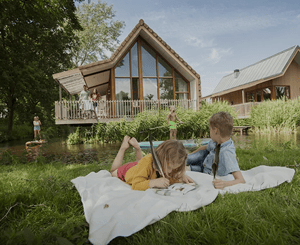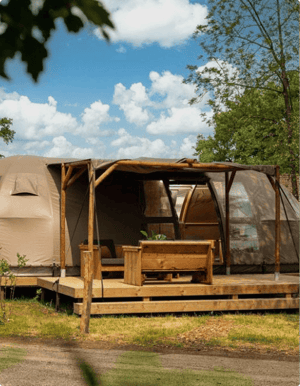In the last decade, the hotel industry has been adopting eco-friendly practices through various measures – whether it is replacing plastic packaging or straw with biodegradable materials, adopting energy-efficient light bulbs like compact fluorescent lamps (CFLs) and light emitting diodes (LEDs), alongside procuring local produces, as well as ethically made and plant-based products etc.
Today, the drive for sustainability in the hospitality industry continues to evolve with the advancements of AI, pushing the boundaries of green practices as the sector competes to amplify its sustainability efforts. This ongoing race is not just about competition but also about doing what we can for the impending climate crisis, highlighting a collective movement towards averting the doomsday scenario of climate change —all driven by our love of Gaia!
In this blog,
Why should Hotels Go Green?
Common challenges in Going Green
Our Favourite Eco-friendly Practices in the Hotel Industry
- Partnering with local businesses
- Maximize Resource Efficiency and Track Waste
- Train Hotel Staff in Eco-friendly Operations
- Go paperless with AI Automation
Present Green Alternatives with Conversational AI
Key Takeaways
Why Should Hotels Go Green?
The answer to the question of why we should go green is a multi-faceted one. In the early years of sustainable hotel practices, it had much to do with corporate responsibility and social image. Engaging in green practices enhances brand reputation, appeals to environmentally conscious consumers, and attracts top talent who want to work for responsible organisations.
While this reasoning remains, we now have all the more reasons to go green. Technological advances now pervades through benefits beyond those of digitalization. The race for green practices now go together with that of adoption of newer innovations. Efficiency, automation, and sustainability – the hotel trinity – are now intertwined, revealing that eco-friendly initiatives not only yield social and environmental benefits but also enhance financial and operational efficiency.
In addition, implementing green practices can lead to compliance with environmental regulations, enhance the hotel’s legal position and mitigate potential risks.
Common challenges in going green
Hotels highlighting green initiatives but not living up to their credentials are seen as green-washing or false advertising in the public’s eyes and tend to be associated with dissatisfaction and unpleasant experiences. So the first challenge is to really live up to your claims!
Then there is a challenge of striking up a balance between cost-effectiveness and customer satisfaction. High upfront costs for green technologies (or fear of them) can stir doubts in hoteliers. That’s why major hotel groups are leading the industry in sustainability practices for they can afford such spending, and that is why in the next section, we’ll include low-cost solutions that hoteliers can implement immediately, even for smaller establishments with limited budgets.
Our favorite eco-friendly practices in the Hotel industry
In the industry focused on poshness and luxury, championing sustainable hotel practices is an ongoing struggle. It reinvents itself through new technologies and platforms endlessly, and balances itself on economic viability and social responsibility.
It need not be a head-scratcher all the time. Some solutions can be implemented instantly and easily without complex procedures or high upfront costs. In this article, we bring to you the best concepts and practices which you can implement immediately to contribute to the better planet you will be welcoming your guests to.
1. Partnering with local businesses
(local organic farms, eco-friendly suppliers, handicraft shops, etc)
Once we prepare to go green, we are usually presented with some approaches that are seen as timeless of all sustainable hotel practices. These include “reducing waste”, implementing the 3 R’s (reduce, reuse, recycle), conserving energy and so on.
Among these many cliches, one practice we believe that is the epitome of socially-conscious tourism and will be around ‘forever’ is establishing partnerships with local businesses. And we don’t mean any local businesses.
Working with local businesses that prioritise and promote eco-friendly practices can create communities with a shared vision. These partnerships go beyond transactions and become collaborations that benefit both parties. We promote them through various means, ensuring a consistent flow of goods and services while seamlessly integrating them into the supply chain.
This not only supports the local economy but also enhances the authenticity of the guest experience, providing a glimpse into the region’s distinctive culture and sustainability initiatives.
2. Maximize Resource Efficiency and Track Waste
The strive towards efficient resource management can be achieved through various technologies available in recent years. Smart metres with machine learning, for example, can detect anomalies in water usage patterns, allowing for swift correction of leaks, overuse, or equipment faults and preventing water wastage.
Smart Room technology can identify unoccupied spaces and automatically adjust settings such as day- and night-modes through LED lighting, smart thermostats according to weather conditions, occupancy sensors and efficient HVAC systems.
3. Train Hotel Staff in Eco-friendly Operations
Bridge the gap between theory and practice, with training that educates staff on your hotel’s sustainability agenda. Constantly preaching your hotel’s environmental goals without a trained operations team can cause stress among your staff. 
To offer a concrete overview of challenges and visions of sustainability in the hotel industry as we know it today, we encourage that SGD-oriented training sessions are provided to the operation personnels and tangible KPI’s be implemented to track progress and measure effectiveness.
4. Go paperless with AI Automation
With integrated PMS, Conversational AI by Runnr.ai can now check your guest in or out with an automated process, without relying on paperwork or even using self-service kiosk machines which still need electricity to run on.
Hotel restaurants can offer digital menus using QR code or links and get paid via online payment services, avoiding paper-based invoices altogether in the property. You may also like to deliver the local newspaper in digital format.
Finally, transitioning from plastic key cards to digital keys (from HOTEK, for example) presents an eco-friendly solution, reducing waste associated with lost key cards. Going paperless not only streamlines operations but also creates space for reforestation efforts in the long run.
See it in action now
5. Present Green Alternatives with Conversational AI
With the most advanced virtual concierge like Runnr.ai, hotels can now personalise messages and suggest sustainable alternatives to guests. For instance, recommending bike rentals over taxi services not only significantly reduces carbon emissions but also promotes environmentally and socially sustainable ecotourism in the larger context.
It can also be through reminders, encouraging guests to participate in a towel and linen reuse program to preserve water and energy, or simply advising to adjust room temperature on leaving the room.
To illustrate this further, hotels can recommend sustainable and organic dining options including vegetarian and plant-based eats. This contributes to sustainable food practices and supports local businesses with eco-friendly initiatives.
Key Takeaways
Green hospitality is here to stay. It is incumbent upon hoteliers to design a guest experience that is in accordance with the best sustainable hotel practices. High upfront costs and project complexity will not shy us away from implementing them.
As our favourite sustainable hotel practices, we highlight and encourage partnering with local businesses, maximising resource efficiency and tracking waste, training hotel staff via SGD-oriented training sessions, and lastly, we present two main AI usages to go paperless as well as encourage guests to use green alternatives with conversational AI.
Join the future of hospitality with Runnr.ai.



.jpg?width=300&name=3-1024x576%20(1).jpg)